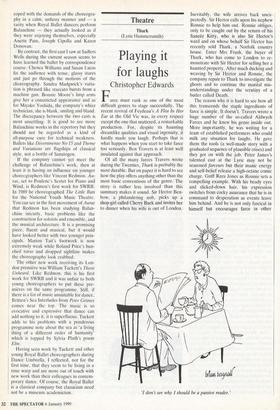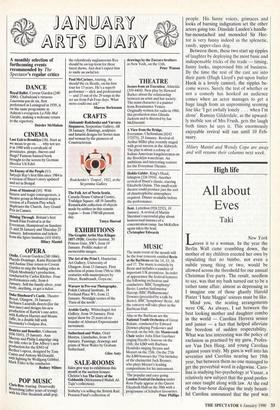Theatre
Thark (Lyric Hammersmith)
Playing it for laughs
Christopher Edwards
Farce must rank as one of the most difficult genres to stage successfully. The recent revival of Feydeau's A Flea In Her Ear at the Old Vic was, in every respect except the one that mattered, a remarkable production. For, despite its haunting dreamlike qualities and visual ingenuity, it hardly made you laugh. Perhaps that is what happens when you start to take farce too seriously. Ben Travers is at least well insulated against that approach.
Of all the many farces Travers wrote during the Twenties, Thark is probably the most durable. But on paper it is hard to see how the play offers anything other than the most basic conventions of the genre. The story is rather less involved than this summary makes it sound. Sir Hector Ben- bow, a philandering nob, picks up a shop-girl called Cherry Buck and invites her to dinner when his wife is out of London. Inevitably, the wife arrives back unex- pectedly. Sir Hector calls upon his nephew Ronnie to help him out. Ronnie obliges, only to be caught out by the return of his fiancée Kitty, who is also Sir Hector's ward and on whose behalf Sir Hector has recently sold Thark, a Norfolk country house. Enter Mrs Frush, the buyer of Thark, who has come to LoncIon to re- monstrate with Sir Hector for selling her a haunted property. After much ducking and weaving by Sir Hector and Ronnie, the company repair to Thark to investigate the ghosts and to continue the marital mis- understandings under the scrutiny of a butler called Death.
The reason why it is hard to see how all this transcends the staple ingredients of farce is simple. It doesn't. Travers wrote a huge number of the so-called Aidwych Farces and he knew his genre inside out. More importantly, he was writing for a team of established performers who could milk any situation for laughs. He gave them the tools (a well-made story with a graduated sequence of plausible crises) and they got on with the job. Peter James's talented cast at the Lyric may not be seasoned farceurs but their manic energy and self-belief releaSe a high-octane comic charge. Griff Rees Jones as Ronnie sets a compelling example. With his beady eyes and slicked-down hair, his expression switches from cocky assurance that he is in command to desperation as events leave him behind. And he is not only farcical in himself but encourages farce in other 'I don't see why I should be a passive reader.' people. His funny voices, grimaces and looks of burning indignation set the other actors going too. Dinsdale Landen's handle- bar-moustached and monocled Sir Hec- tor is very funny indeed as the splenetic, randy, upper-class dog.
Between them, these two start up ripples of laughter by deploying the most basic and indispensable tricks of the trade — timing, funny looks, improvised bits of business. By the time the rest of the cast are into their parts (Hugh Lloyd's put-upon butler Hook is a lovely cameo), the ripples be- come waves. Surely the test of whether or not a comedy has hooked an audience comes when an actor manages to get a huge laugh from an unpromising seeming line like 'I get awfully lonely . . . when I'm alone'. Ramsay Gilderdale, as the upward- ly mobile son of Mrs Frush, gets the laugh both times he says it. This enormously enjoyable revival will run until 10 Feb- ruary.











































 Previous page
Previous page